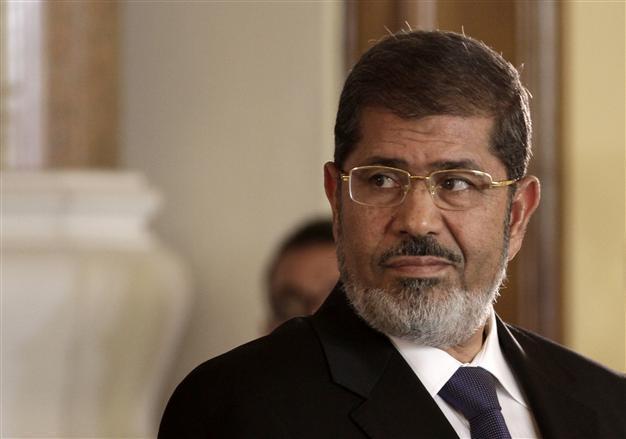Egypt panel agrees on Islamic principles in constitution
CAIRO - Agence France-Presse

Egyptian President Mohammed Morsi. AP Photo
Egypt's constituent assembly voted on Thursday to keep a vaguely worded Mubarak-era article in the new charter that the principles sharia (Islamic law) are the main source of legislation.The panel is voting on the constitution article by article, and unanimously approved keeping the formulation from the past constitution, which was suspended after a popular uprising overthrew Hosni Mubarak in early 2011.
The clause states that "Islam is the state religion, and the Arabic language is its official language. The principles of Islamic sharia are the main source of legislation." A still unagreed clause, Article 219, seeks to explain the clause on Islamic law in terms of Sunni Muslim jurisprudence.
The assembly also agreed a clause stating that the principles of Christian and Jewish legal traditions would guide their personal and religious affairs.
Egypt panel gathers to vote on divisive charter
A controversial panel boycotted by liberals and Christians gathered Thursday to vote on a new Egyptian constitution that is at the heart of a power struggle between the Islamist president and his opposition.
Live television footage showed members being asked to sit down in the senate building, where the panel has met for more than over five months, to prepare for the procedure.
The vote comes amid accusations the Islamist-dominated panel is railroading the charter and as protests mount over President Mohamed Morsi's assumption of sweeping powers, which has plunged the country into its worse crisis since he took office in June.
Sixty-seven percent of votes are needed for the charter to be approved, failing which a second round will be held in which 57 percent of the votes will be sufficient.
After 24 hours, the panel will meet to find alternatives to rejected articles, or strike them from the charter.
The draft constitution will then be sent to Morsi, who may call a referendum to ratify the new constitution within two weeks.
A court had disbanded a previous constituent assembly and was due to rule on the validity of the current assembly on December 2. Morsi however last week stripped courts of the power to disband the panel in a decree that also gave him broad powers that cannot be challenged by courts, sparking a judicial strike and mass rallies.
Liberals, leftists, and representatives if Egypt's churches had already withdrawn from the panel tasked with preparing the constitution to replace the one suspended after president Hosni Mubarak's overthrow in early 2011.
They had complained the assembly was undemocratic and rushed.
In his decree, Morsi allowed the assembly a further two months after its mid-December deadline to finish the charter, making the its announcement on Wednesday that it would imminently approve the charter even more of a shock to the opposition.
Morsi and his supporters argue that delaying the constitution, which would be followed by parliamentary elections to replace the Islamist-dominated house dissolved by a court earlier this year, would delay democratic transition.
The sweeping powers Morsi granted himself last week will expire once a constitution is ratified in a referendum.
















